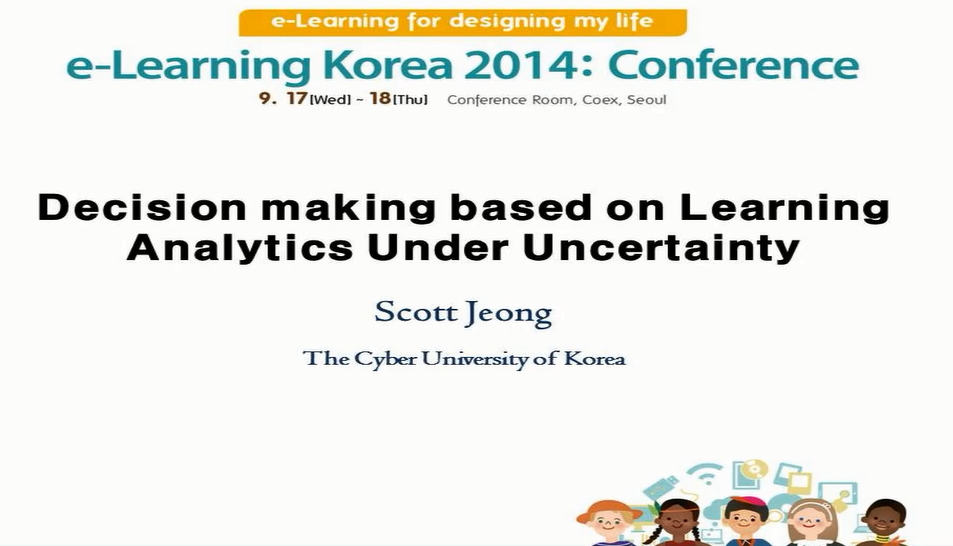비동시적 온라인 토론활동은 면대면 활동에 비해 많은 교육적 강점이 있음에도 불구하고 온라인이라는 자율적·독립적인 학습환경에서 비동시적으로 토론이 이루어지다 보니 학습자들의 ...
http://chineseinput.net/에서 pinyin(병음)방식으로 중국어를 변환할 수 있습니다.
변환된 중국어를 복사하여 사용하시면 됩니다.
- 中文 을 입력하시려면 zhongwen을 입력하시고 space를누르시면됩니다.
- 北京 을 입력하시려면 beijing을 입력하시고 space를 누르시면 됩니다.

비동시적 온라인 토론에서 대시보드 유형과 학습자 특성이 교육효과에 미치는 영향 = The Effects of Dashboard Types and Learner Characteristics on Educational Effectiveness in Asynchronous Online Discussion
한글로보기https://www.riss.kr/link?id=A106288767
- 저자
- 발행기관
- 학술지명
- 권호사항
-
발행연도
2019
-
작성언어
-
- 주제어
-
등재정보
KCI등재
-
자료형태
학술저널
- 발행기관 URL
-
수록면
339-364(26쪽)
-
KCI 피인용횟수
10
- DOI식별코드
- 제공처
- 소장기관
-
0
상세조회 -
0
다운로드
부가정보
국문 초록 (Abstract)
비동시적 온라인 토론활동은 면대면 활동에 비해 많은 교육적 강점이 있음에도 불구하고 온라인이라는 자율적·독립적인 학습환경에서 비동시적으로 토론이 이루어지다 보니 학습자들의 보다 적극적인 참여와 노력이 요구된다. 이러한 어려움을 극복하기 위한 방안으로 온라인 토론활동에 대한 과정과 결과를 분석하여 대시보드 형태로 제공해 주는 연구가 이루어지고 있다. 온라인 토론활동에 대한 대시보드 관련 선행연구들은 개발에 초점을 둔 연구가 대부분이고 그 교육적 효과를 학습자들의 특성에 따라 분석한 연구는 드물다. 이 연구의 목적은 비동시적 온라인 토론활동에 대한 참여도와 상호작용 대시보드가 학습자들의 특성에 따라 토론활동에 미치는 영향에 차이가 있는지를 분석하는 것이다. 연구참여자는 2018학년도 2학기 H대학교의 ‘평생교육과 창의성’ 두 분반에 수강한 54명의 학습자들이었다. 독립변인은 대시보드 유형과 사회비교동기, 온라인커뮤니케이션 도구에 대한 인식, 자기성찰수준이었고 종속변인으로는 참여도, 상호작용, 학습성과, 사회적 실재감, 인지된 상호작용이었다. 28명의 A집단에게는 참여도 대시보드를 제공하였고 26명으로 구성된 B집단에게는 참여도와 상호작용 대시보드를 제공하였다. 사전 검사를 통해 두 집단의 동질성이 확인되었고 2회에 걸친 온라인 토론활동을 통해 수집한 데이터와 사후 검사 결과를 분석하였다. 연구결과, 1차 토론에서는 두 집단 간 온라인 토론활동에 대한 참여도와 상호작용에는 유의한 차이가 없었으나 2차 토론에서 참여도와 상호작용 대시보드를 제공 받은 B집단이 실제 온라인 토론에 더 많이 참여하고 상호작용 빈도도 높은 것으로 확인되었다. 대시보드 유형별 학습자들의 온라인 토론학습에 대한 학습성과, 사회적 실재감, 인지된 상호작용에 미친 영향을 분석한 결과 참여도와 상호작용 대시보드를 모두 제공받은 집단이 사회적 실재감과 인지된 상호작용에 있어 통계적으로 유의하게 높게 나타났다. 그리고 학습자의 사회비교경향성과 자기성찰 수준이 높은 집단이 낮은 집단에 비해 온라인 토론활동에 대한 학습성과와 인지된 상호작용에 대해 보다 긍정적으로 인식한 것으로 확인되었다. 그러나 대시보드유형과 학습자 특성 간 상호작용 효과는 유의하지 않은 것으로 나타났다. 연구결과에 기반하여 온라인 토론활동에서 대시보드 활용에 대한 시사점을 논의하였다.
다국어 초록 (Multilingual Abstract)
Asynchronous discussions take place in an autonomous and independent learning environment, so learners need more engagement and effort. As a way to overcome these difficulties and to support online discussion activities, researches are being conducted...
Asynchronous discussions take place in an autonomous and independent learning environment, so learners need more engagement and effort. As a way to overcome these difficulties and to support online discussion activities, researches are being conducted to provide a dashboard form by analyzing the process and results of online discussion activities. Research on dashboards for online discussion activities focuses mostly on development, and there were few studies that analyzed the educational effects according to learner‘s characteristics. This study analyzed whether the participation and interaction dashboards on asynchronous online discussion activities had a significant effect on learner's discussion activities according to learner characteristics. Participants were 54 learners. Independent variables were dashboard type, social comparison motivation, perception of online communication tools, and self-reflection. Dependent variables were participation, interaction, learning outcome, social presence, and perceived interaction. Group A with 28 learners provided a participatory dashboard and group B of 26 learners provided a participation and an interaction dashboards. The homogeneity of the two groups was confirmed through pre-test, and the results were obtained by analyzing the collected data through two online discussion activities and post-test results. As a result, there was no significant difference in the participation and interaction of the online discussion activities between the two groups in the first discussion, but the group B receiving the participation and interaction dashboard in the second discussion, participated more in the actual online discussion, it was also found to have a lot of interactions. The participants who received both the participation and interaction dashboards showed a statistically significant higher level of social presence and perceived interaction. Also, it was found that the group with higher social comparison tendency and self - reflection level perceived more positively about learning outcomes and perceived interactions with online discussion activities than the low group. However, the interaction effect between dashboard type and learner characteristics was not significant. Based on the results of the research, implications for the use of dashboards in online discussion activities were discussed.
참고문헌 (Reference)
1 유미나, "학습분석 기반 온라인 토론활동의 시각화 원리 개발" 한국교육공학회 33 (33): 901-941, 2017
2 이현영, "인터넷을 활용한 원격교육에서 학습자의 성취목표성향, 자기효능감, 원격교육에 대한 태도, 자기조절학습전략과 성취도, 참여도, 만족도와의 관계연구" 이화여자대학교 교육대학원 2005
3 진성희, "이러닝 학습환경에서 학습분석기반 대시보드 연구동향 분석" 한국교육정보미디어학회 21 (21): 185-213, 2015
4 진성희, "이러닝 학습자들의 사회비교동기 유형에 따른 EngageGram이 학습참여도에 미치는 효과" 한국콘텐츠학회 15 (15): 652-661, 2015
5 임규연, "웹기반 협력학습에서 참여와 상호작용의 차이에 대한 고찰" 한국컴퓨터교육학회 17 (17): 69-78, 2014
6 윤성혜, "웹기반 협력학습 성과에 대한 학습자의 메타인지와 인지된 상호작용의 예측력 규명" 이화여자대학교 대학원 2012
7 김명랑, "웹기반 협동학습에서 학습스타일과 보상구조가 학습자간 상호작용에 미치는 영향" 고려대학교 대학원 2009
8 임규연, "웹 기반 온라인 토론에서 학습자의 참여도, 성취도 및 만족도에 영향을 미치는 요인" 梨花女子大學校 大學院 1999
9 조은미, "온라인 학습공동체에서 사회적 실재감이 학습몰입과 학습효과에 미치는 영향" 한국교육정보미디어학회 16 (16): 23-43, 2010
10 유미나, "온라인 토론활동의 참여를 촉진하기 위한 대시보드 개발 및 적용" 한국교육정보미디어학회 24 (24): 517-542, 2018
1 유미나, "학습분석 기반 온라인 토론활동의 시각화 원리 개발" 한국교육공학회 33 (33): 901-941, 2017
2 이현영, "인터넷을 활용한 원격교육에서 학습자의 성취목표성향, 자기효능감, 원격교육에 대한 태도, 자기조절학습전략과 성취도, 참여도, 만족도와의 관계연구" 이화여자대학교 교육대학원 2005
3 진성희, "이러닝 학습환경에서 학습분석기반 대시보드 연구동향 분석" 한국교육정보미디어학회 21 (21): 185-213, 2015
4 진성희, "이러닝 학습자들의 사회비교동기 유형에 따른 EngageGram이 학습참여도에 미치는 효과" 한국콘텐츠학회 15 (15): 652-661, 2015
5 임규연, "웹기반 협력학습에서 참여와 상호작용의 차이에 대한 고찰" 한국컴퓨터교육학회 17 (17): 69-78, 2014
6 윤성혜, "웹기반 협력학습 성과에 대한 학습자의 메타인지와 인지된 상호작용의 예측력 규명" 이화여자대학교 대학원 2012
7 김명랑, "웹기반 협동학습에서 학습스타일과 보상구조가 학습자간 상호작용에 미치는 영향" 고려대학교 대학원 2009
8 임규연, "웹 기반 온라인 토론에서 학습자의 참여도, 성취도 및 만족도에 영향을 미치는 요인" 梨花女子大學校 大學院 1999
9 조은미, "온라인 학습공동체에서 사회적 실재감이 학습몰입과 학습효과에 미치는 영향" 한국교육정보미디어학회 16 (16): 23-43, 2010
10 유미나, "온라인 토론활동의 참여를 촉진하기 위한 대시보드 개발 및 적용" 한국교육정보미디어학회 24 (24): 517-542, 2018
11 유미나, "온라인 토론활동에 대한 학습분석기반 대시보드 사례 분석 연구" 한국교육정보미디어학회 23 (23): 465-497, 2017
12 진성희, "온라인 토론활동에 대한 참여도 대표변인 및 AHP 기법에 의한 가중치 결정" 한국교육정보미디어학회 23 (23): 945-971, 2017
13 조영환, "온라인 토론 촉진을 위한 피드백의 역할 탐색" 교육연구소 16 (16): 289-313, 2015
14 진성희, "온라인 찬반토론 현황 대시보드가 토론 만족도 및 학습자 인식에 미치는 영향" 학습자중심교과교육학회 19 (19): 41-61, 2019
15 남창우, "모바일러닝 환경에서 모바일 기기와 온라인커뮤니케이션 도구 활용 인식 및 집단자존감이 협력학습 태도에 미치는 영향" 한국교육정보미디어학회 19 (19): 811-835, 2013
16 한옥결, "대시보드를 활용한 자기성찰 교수관리전략 개발" 서울대학교 교육대학원 2019
17 Janssen, J., "Visualizing participation to facilitate argumentation" 2006
18 Jin, S., "Using visualization to motivate student participation in collaborative online learning environments" 20 (20): 51-62, 2017
19 Anderson, T., "Towards a theory of online learning" 2 : 109-119, 2004
20 Anderson, T. D., "The virtual conference : Extending professional education in cyberspace" 2 (2): 121-135, 1996
21 Govaerts, S., "The student activity meter for awareness and self-reflection" ACM 869-884, 2012
22 Grant, A., "The self-reflection and insight scale: A new measure of private self-consciousness" 30 (30): 821-835, 2002
23 Wen, H. M., "The effects of task structure on group process and quality of group product in a cooperative project-based learning environment" The Florida State University 1998
24 Lambropoulos, N., "Supporting social awareness in collaborative e-learning" 43 (43): 295-306, 2012
25 Coulson, D., "Scaffolding student reflection for experience-based learning : A framework" 18 (18): 401-413, 2013
26 Swan, K., "On the nature and development of social presence in online course discussions" 9 (9): 115-136, 2005
27 Gao, F., "New Model of Productive Online Discussion and Its Implications for Research and Instruction" 2 (2): 65-, 2009
28 Helgeson, V. S., "Motives for social comparison" 21 (21): 1200-1209, 1995
29 Macfadyen, L. P., "Mining LMS data to develop an"early warning system"for educators : A proof of concept" 54 (54): 588-599, 2010
30 Hawkes, M., "Linguistic discourse vairables as indicators of reflective online interaction" 20 (20): 231-244, 2006
31 Thomas, M. J., "Learning within incoherent structures: The space of online discussion forums" 18 (18): 351-366, 2002
32 Ferguson, R., "Learning analytics: drivers, developments and challenges" 4 (4): 304-317, 2012
33 Wise, A. F., "Learning analytics for online discussions: a pedagogical model for intervention with embedded and extracted analytics" ACM 48-56, 2013
34 Tan, J. P. L., "Learner dashboards a double-edged sword? Students’ sense-making of a collaborative critical reading and learning analytics environment for fostering 21st century literacies" 4 (4): 117-140, 2017
35 Tobarra, L., "Integrated Analytic dashboard for virtual evaluation laboratories and collaborative forums" IEEE XI : 1-6, 2014
36 Few, S., "Information dashboard design" O’Reilly 2006
37 Gibbons, F. X., "Individual differences in social comparison : development of a scale of social comparison orientation" 76 (76): 129-, 1999
38 Hewitt, J., "How habitual online practices affect the development of asynchronous discussion threads" 28 (28): 31-45, 2003
39 Hew, K. F., "Higher-level knowledge construction in asynchronous online discussions: An analysis of group size, duration of online discussion, and student facilitation techniques" 39 (39): 303-319, 2011
40 Woods, K., "Facilitating Successful Online Discussions" 16 (16): 76-92, 2016
41 Thomas, J., "Exploring the use of asynchronous online discussion in health care education: a literature review" 69 : 199-215, 2013
42 Chang, S. H. H., "Effectiveness of Personal Interaction in a Learner-Centered Paradigm Distance Education Class Based on Student Satisfaction" 40 (40): 407-426, 2008
43 Williamson, S. N., "Development of a self-rating scale of self-directed learning" 14 (14): 66-83, 2007
44 Myunghee KANG, "Developing a Social Presence Scale for Measuring Students’ Involvement during e-Learning Process" 한국교육공학회 9 (9): 1-15, 2008
45 Gao, F., "Designing asynchronous online discussion environments : recent progress and possible future directions" 44 (44): 469-483, 2013
46 Dyckhoff, A. L., "Design and implementation of a learning analytics toolkit for teachers" 15 (15): 58-76, 2012
47 Hara, N., "Content analysis of online discussion in an applied educational psychology course" 28 (28): 115-152, 2000
48 Larson, B. E., "Classroom discussion and threaded electronic discussion : Learning in two arenas" 2 (2): 45-62, 2002
49 Swan, K., "Building Learning Communities in Online Courses: the importance of interaction" 2 (2): 23-49, 2002
50 Picciano, A. G., "Beyond student perceptions : Issues of interaction, presence and performance in an online course" 6 (6): 21-40, 2002
51 Duval, E., "Attention please!: learning analytics for visualization and recommendation" ACM 9-17, 2011
52 Hatala, M., "Associations between students' approaches to learning and learning analytics visualizations" 2016
53 Festinger, L., "A theory of social comparison processes" 7 (7): 117-140, 1954
54 Murray, T., "A prototype facilitators dashboard: assessing and visualizing dialogue quality in online deliberations for education and work" 2013
55 Weinberger, A., "A framework to analyze argumentative knowledge construction in computer-supported collaborative learning" 46 (46): 71-95, 2006
56 Iandoli, L., "A debate dashboard to enhance online knowledge sharing" 42 (42): 67-93, 2012
동일학술지(권/호) 다른 논문
-
미래 사회와 교육을 위한 교육공학 연구 및 실천 영역의 재조명
- 한국교육공학회
- 임철일 ( Cheolil Lim )
- 2019
- KCI등재
-
미국 역량중심 교육정책 분석과 국내 역량중심교육에 대한 시사점
- 한국교육공학회
- 류태호 ( Taeho Yu )
- 2019
- KCI등재
-
기계학습: 대용량/패널자료와 학습분석학 자료 분석으로의 활용
- 한국교육공학회
- 유진은 ( Jin Eun Yoo )
- 2019
- KCI등재
-
메이커교육 아웃리치 프로그램 사례: 메이커 정신 함양을 중심으로
- 한국교육공학회
- 윤혜진 ( Hyea Jin Yoon )
- 2019
- KCI등재
분석정보
인용정보 인용지수 설명보기
학술지 이력
| 연월일 | 이력구분 | 이력상세 | 등재구분 |
|---|---|---|---|
| 2027 | 평가예정 | 재인증평가 신청대상 (재인증) | |
| 2021-01-01 | 평가 | 등재학술지 유지 (재인증) |  |
| 2018-01-01 | 평가 | 등재학술지 유지 (등재유지) |  |
| 2015-01-01 | 평가 | 등재학술지 유지 (등재유지) |  |
| 2011-01-01 | 평가 | 등재학술지 유지 (등재유지) |  |
| 2009-01-01 | 평가 | 등재학술지 유지 (등재유지) |  |
| 2007-01-01 | 평가 | 등재학술지 유지 (등재유지) |  |
| 2004-01-01 | 평가 | 등재학술지 선정 (등재후보2차) |  |
| 2003-01-01 | 평가 | 등재후보 1차 PASS (등재후보1차) |  |
| 2002-01-01 | 평가 | 등재후보 1차 FAIL (등재후보1차) |  |
| 1999-07-01 | 평가 | 등재후보학술지 선정 (신규평가) |  |
학술지 인용정보
| 기준연도 | WOS-KCI 통합IF(2년) | KCIF(2년) | KCIF(3년) |
|---|---|---|---|
| 2016 | 3.7 | 3.7 | 3.26 |
| KCIF(4년) | KCIF(5년) | 중심성지수(3년) | 즉시성지수 |
| 2.89 | 2.68 | 3.751 | 0.75 |





 KCI
KCI KISS
KISS





